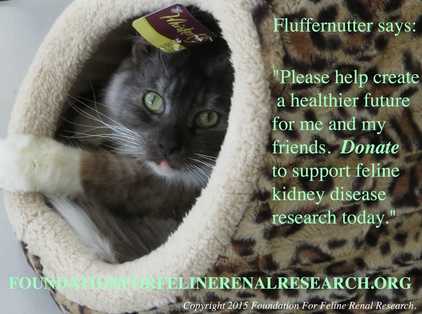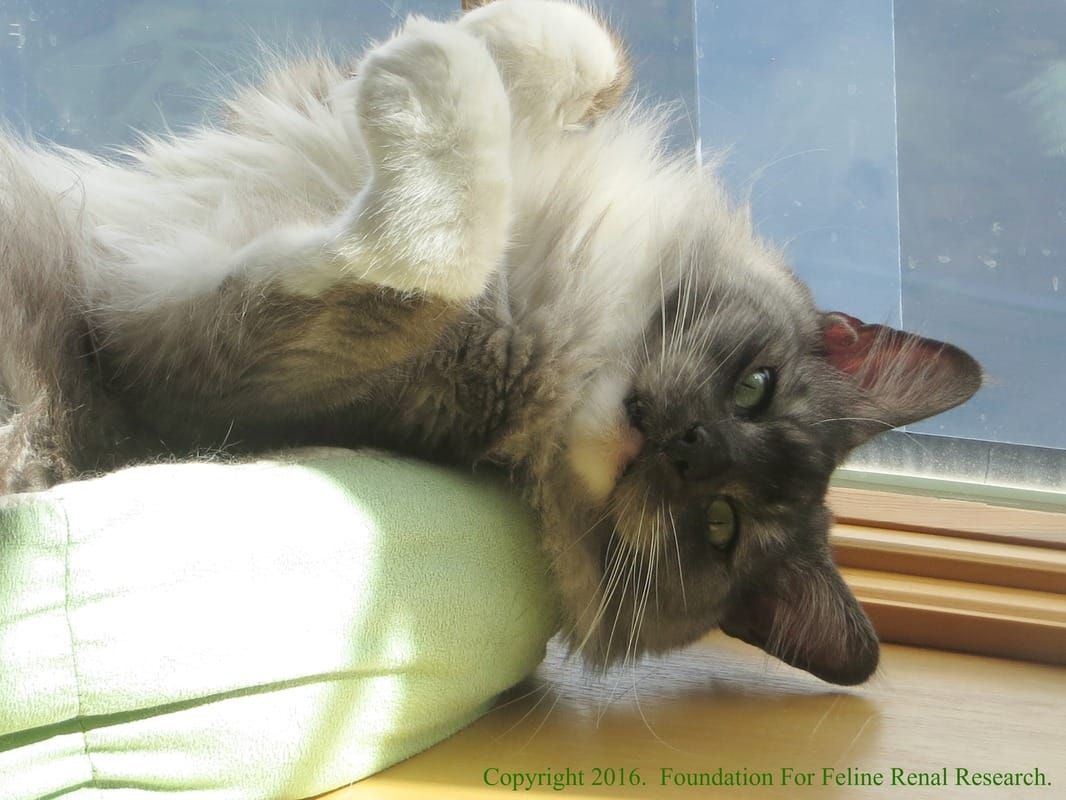(Updated on March 2, 2019)
What Can I Do to Prevent Kidney Disease in My Cat?
Feline Chronic Kidney Disease (Feline CKD) causes tremendous pain and suffering, and claims the lives of approximately one of every three cats. People frequently ask us, "What can I do to prevent kidney disease in my cat?" Feline CKD is a progressive disease, and there is currently no known prevention or cure. We're proud to be supporting the research of the best academic veterinarians in the field as they work diligently towards better treatments and, ultimately, a cure(s). (Feline CKD is a complex disease, and kidney damage may occur via multiple mechanisms.) In the meantime, you need not feel helpless. Here’s what you can do to help keep your cat healthy for as long as possible:
I. See Your Vet Regularly.
Your first line of defense is regular veterinary checkups. Although CKD in cats is notoriously difficult to detect, (clinical signs usually don’t appear until about 70% of kidney function is lost), regular veterinary care, including blood tests, urinalysis, and blood pressure measurement, will help your vet detect the disease as early possible. Cats are masters at hiding illness and pain, so regular checkups are very important, even if your cat seems well. According to the American Veterinary Medical Association (AVMA), cats should have yearly veterinary checkups until they reach about 7 years of age, at which time checkups should be increased to every six months. (Each cat is different and, especially if your cat has a known medical problem, they may need to be seen more frequently. Speak to your vet about your cat’s particular needs).
Also, be certain that your vet knows about the International Renal Interest Society (IRIS). Their team of world-renowned veterinary nephrology experts (including Dr. Jonathan Elliott, a giant in the field of Feline CKD research, whose current genetics research we’re very proud to be supporting), promulgates staging and management recommendations that are considered the gold standard for vets.
II. Know What’s Normal.
Each cat is a unique individual. Keep close track of what’s “normal” for your cat. Being attuned to your cat’s typical behavior will help you spot deviations that may be signs of trouble. If your cat doesn’t seem to be acting quite right, don’t just assume it’s part of the normal aging process. Here’s an article from the American Association of Feline Practitoners (AAFP) about monitoring your cat's behavior. And this article by Preventive Vet, about how to detect pain in cats, discusses a variety of very subtle behavior changes that can be signs of trouble.
III. Know the Signs of Feline CKD.
Signs can vary, but some of the most common ones are excessive drinking, excessive urination, poor appetite, vomiting, weight loss, lethargy, and neurologic problems including confusion and loss of coordination. If your feline companion exhibits any of these signs, bring them to the vet without delay. If your cat is diagnosed with CKD, your vet can recommend measures that may help him/her feel better, and slow (although not prevent) progression. Such measures may include special food, medications, and subcutaneous fluids.
IV. Practice Good Oral Hygiene.
Early research indicates that advanced dental disease MAY be associated with kidney disease in cats. This is very early research, and more investigation is needed. But good dental hygiene is always a great idea, so have your vet check your cat’s teeth during checkups. And, if your cat will permit it, brush her/his teeth. Here’s a video from Cornell University about how to accustom cats to tooth brushing.
Finally, please don’t overlook the last very important step that you can take in the battle against Feline Chronic Kidney Disease--become an ally! We are completely committed to working hard for as long as necessary until a cure is found, but we can’t do it without your help! Please check out our research pages, and please donate so that we can keep supporting the very best, most promising research. You can help us give cats a healthier future—there is so much to be done!
What Can I Do to Prevent Kidney Disease in My Cat?
Feline Chronic Kidney Disease (Feline CKD) causes tremendous pain and suffering, and claims the lives of approximately one of every three cats. People frequently ask us, "What can I do to prevent kidney disease in my cat?" Feline CKD is a progressive disease, and there is currently no known prevention or cure. We're proud to be supporting the research of the best academic veterinarians in the field as they work diligently towards better treatments and, ultimately, a cure(s). (Feline CKD is a complex disease, and kidney damage may occur via multiple mechanisms.) In the meantime, you need not feel helpless. Here’s what you can do to help keep your cat healthy for as long as possible:
I. See Your Vet Regularly.
Your first line of defense is regular veterinary checkups. Although CKD in cats is notoriously difficult to detect, (clinical signs usually don’t appear until about 70% of kidney function is lost), regular veterinary care, including blood tests, urinalysis, and blood pressure measurement, will help your vet detect the disease as early possible. Cats are masters at hiding illness and pain, so regular checkups are very important, even if your cat seems well. According to the American Veterinary Medical Association (AVMA), cats should have yearly veterinary checkups until they reach about 7 years of age, at which time checkups should be increased to every six months. (Each cat is different and, especially if your cat has a known medical problem, they may need to be seen more frequently. Speak to your vet about your cat’s particular needs).
Also, be certain that your vet knows about the International Renal Interest Society (IRIS). Their team of world-renowned veterinary nephrology experts (including Dr. Jonathan Elliott, a giant in the field of Feline CKD research, whose current genetics research we’re very proud to be supporting), promulgates staging and management recommendations that are considered the gold standard for vets.
II. Know What’s Normal.
Each cat is a unique individual. Keep close track of what’s “normal” for your cat. Being attuned to your cat’s typical behavior will help you spot deviations that may be signs of trouble. If your cat doesn’t seem to be acting quite right, don’t just assume it’s part of the normal aging process. Here’s an article from the American Association of Feline Practitoners (AAFP) about monitoring your cat's behavior. And this article by Preventive Vet, about how to detect pain in cats, discusses a variety of very subtle behavior changes that can be signs of trouble.
III. Know the Signs of Feline CKD.
Signs can vary, but some of the most common ones are excessive drinking, excessive urination, poor appetite, vomiting, weight loss, lethargy, and neurologic problems including confusion and loss of coordination. If your feline companion exhibits any of these signs, bring them to the vet without delay. If your cat is diagnosed with CKD, your vet can recommend measures that may help him/her feel better, and slow (although not prevent) progression. Such measures may include special food, medications, and subcutaneous fluids.
IV. Practice Good Oral Hygiene.
Early research indicates that advanced dental disease MAY be associated with kidney disease in cats. This is very early research, and more investigation is needed. But good dental hygiene is always a great idea, so have your vet check your cat’s teeth during checkups. And, if your cat will permit it, brush her/his teeth. Here’s a video from Cornell University about how to accustom cats to tooth brushing.
Finally, please don’t overlook the last very important step that you can take in the battle against Feline Chronic Kidney Disease--become an ally! We are completely committed to working hard for as long as necessary until a cure is found, but we can’t do it without your help! Please check out our research pages, and please donate so that we can keep supporting the very best, most promising research. You can help us give cats a healthier future—there is so much to be done!
Categories
All
Blood Pressure
Cat Stories
Dental
Feline CKD
Hypertension
IRIS
Veterinary Care


 RSS Feed
RSS Feed


